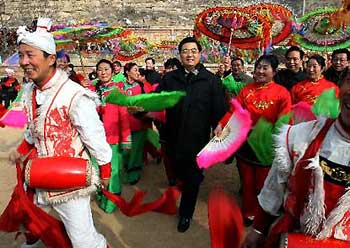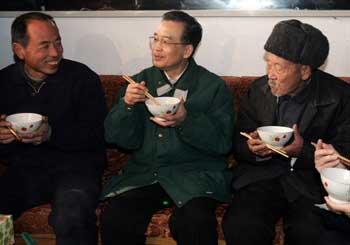|
Top leaders visit farmers on New Year's Eve
(Xinhua)
Updated: 2006-01-29 08:43 Chinese President Hu Jintao and Premier Wen Jiabao
both came to farmers' families to celebrate the lunar New Year. Experts said
their New Year trips to rural areas showed the top leadership's resolution to
build a new socialist countryside aimed at common prosperity.
Joining villagers in dancing popular rural folk dance "Yangge" and making
glutinous rice cake or "niangao," President Hu spent the New Year's Eve in
farmer Kang Haifa's home, in Hougoumen Village of Ansai County in the
revolutionary base of Yan'an, in northwest China's Shaanxi Province.

President Hu Jintao
joins villagers in folk dance to celebrate the Chinese New Year in
Hougoumen Village of Ansai of Yan'an, in northwestern Shaanxi Province on
Jan. 28, 2006. [Xinhua] |
Enjoying fried "niangao" with family-made rice wine, he told Kang's family
that the goal of building a new socialist countryside in China is to ensure the
farmers become rich more quickly, so that festival food such as "niangao" will
become their daily diet and their standards of living will become better year by
year.
Premier Wen on Friday and Saturday visited the people in east China's
Shandong Province. In farmer Guo Xuchen's home, in Guozhuang Village of Heze
City, the premier gave money to Guo, whose wife has been sick for years and who
have financial difficulties in living.
On Friday afternoon, he went to a village clinic and talked with doctor Dong
Longxiang. "We should boost the new rural cooperative medical system so that
farmers can afford medical care," he said.

Premier Wen Jiaobao
eats dumplings with people in Guozhuang Village of Heze City, Shandong
Provice on Jan. 28, or the Chinese New Year's eve.
[Xinhua] |
John McDonald, an expert on China issues living in New Zealand,said in a
Xinhua interview that the fact of Chinese leaders visiting farmers at the
country's most celebrated holiday for three straight years demonstrated their
great concern to farmers and the countryside.
"Their new year trips to rural areas also illustrated the Chinese
government's resolution to narrow the gap between the countryside and city,
farmers and urban citizens, so as to avoid social disturbance and build a
harmonious society," he said.
Wu Jiang, an expert on governmental administration and president of the
Chinese Academy of Personnel Science, said in an interview with Xinhua that the
President and Premier are taking actions to tell the general public that the
construction of "a new countryside" is by no means a slogan, but a top issue in
government's work agenda.
The 5th Plenum of the 16th Central Committee of the Communist Party of China
mapped out a scheme to boost the construction of a new socialist countryside in
October 2005.
The objectives of the scheme include continuously development of agriculture,
affluent and civilized for rural residents, good village environment and
democratic administration of village affairs.
To reach the objectives, Premier Wen promised in an important speech on rural
issues made on Dec. 29, 2005 that the Chinese government will, in the 2006-2010
period, input more financial resources to improve farmers' living and production
conditions, promote compulsory education in rural areas, maintain the balance
between food supply and demand, deepen institutional reform at the township
level and financial reform at county and township levels,provide subsidized
medical care and social security for rural residents and curb illegal farmland
acquisition.
"Actually, a series of policies in favor of rural areas were taken in the
year 2005," said Wu, the government administration expert.
Last December, the Standing Committee of the 10th National People's Congress,
China's top legislature, abolished the 2,600-year-old agricultural tax. In fact,
with the fast economic development in the country, the government began to phase
out the agricultural tax on a trial basis as early as in 2000. The tax reform
helped reduce farmers' tax burden by 23.4 billion yuan (2.9billion U.S. dollars)
from 2001 to 2004 and 22 billion yuan (2.7 billion U.S. dollars) in 2005.
Premier Wen announced last December that tuitions for nine-year compulsory
education in rural areas would be exempted within two years. The central
government and local governments at various levels would allocate a total of
218.9 billion yuan (27 billion U.S. dollars) to subsidize compulsory education
in rural areas in the 2006-2010 period.
A report issued by the national legislature last October for the first time
disclosed that about 40 million farmers had lost farmland in the country's
urbanization process.
Premier Wen said in his latest speech that "we absolutely can't commit an
historic error as far as the issue of land is concerned," which demonstrates his
and the government's strong will to effectively curb the rampant land seizures
for non-agricultural purposes in rural areas.
|